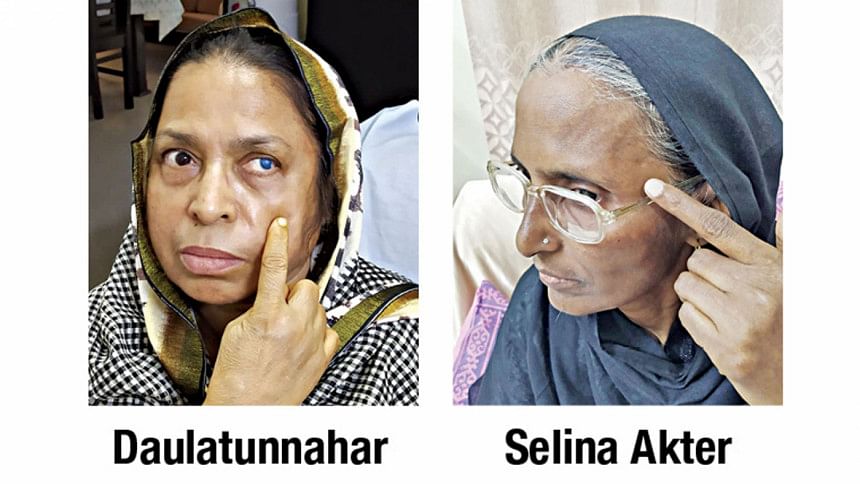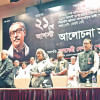Living with traumas and splinters

Daulatun Nahar shudders when questions are asked about the August 21 grenade attack that forced her to adjust to a life of pain and trauma. Many nights she cannot sleep due to the physical suffering caused by splinters that live in her body in the hundreds.
Though the 55-year-old woman survived the gruesome attack, she lost sight in her left eye, developed multiple health complications and cannot walk properly despite undergoing six surgeries in Bangladesh and India. Thoughts of the fateful afternoon still send shivers down her spine.
"Our leader [AL President Sheikh Hasina] was about to end her speech. All of a sudden we heard the first explosion. Then there followed the blasts of several other grenades. I fell down after sustaining splinter injuries and passed out. As I regained consciousness, I found blood gushing out of my legs profusely," Nahar, the then vice-president of Pallabi thana unit Mohila Awami League.
"I still have nightmares. No matter how much I tried, I could not get over those painful memories. All we want now is justice and capital punishment for the perpetrators," she told this newspaper yesterday, on the eve of the 19th anniversary of the attack, which left 24 killed and 300 wounded.
Prime Minister Sheikh Hasina, the then opposition leader, narrowly escaped death with injuries to her right ear. Ivy Rahman, wife of late president Zillur Rahman, was among those killed.
Three other survivors recount the attack that has caused long-term damage to their bodies, leaving them traumatised for life. They also share the pain of living with several hundred splinters and how they have been dealing with the traumas and financial strains that followed after the attack.
Back in 2004, Rotna Akter Ruby, 42, was an AL activist from Mirpur area. She was left inside the Dhaka Medical College Hospital morgue as everyone thought she was dead.
"After regaining consciousness, I found myself inside the morgue, next to another body … Although I recovered gradually, the physical and mental scars did not leave me behind. Doctors told me that I have to bear this pain as long as I am alive. But the pain is so excruciating that I think it would have been better to die that day," she added.
In the photos that appeared in newspapers after the grenade attack, she was seen in a blood-stained sari, lying among the dead on Bangabandhu Avenue. Her kidney on the right side had to be surgically removed a few months after the incident. She still carries around 50 splinters in her body.
Besides, she has been suffering from various diseases, including skin disease with both her legs swelling up at times. Her family has to spend nearly TK 30,000 every month for her treatment.

Stories of Selina Khatun and Nargis Akter are similarly distressing.
Selina, 43, the then women affairs secretary of Kalabagan ward unit AL, saw her sister die in front of her own eyes while she lay injured. She survived and now has over 1,000 splinters still stuck inside her body. She lost her job after the incident.
"My elder sister Sufia Khatun and I were sitting in the third row of the rally on that day. Suddenly, I saw my sister lying in the streets, all smeared with blood," Selina told this correspondent.
After the incident, she lost her job as an office assistant at the National University, Selina said, adding that she's struggling to provide for her family, let alone continue her treatment.
Talking about the day, Nargis, 50, the then woman affairs secretary of Bhatara union AL, said, "I was on the north corner of the makeshift rally stage. Before I could understand anything, I fell down on the ground after a huge explosion. Memories of that day are still fresh in my mind."
"19 years have passed since the incident. Still, I could not regain my strength fully. I still can't have solid food. I spent many days on water. I still have to take more medicine than food," she said.
"Now I have only one demand -- punishment of the culprits. If they are punished, I will get some relief," she added.
In a verdict delivered on October 10, 2018, by a special tribunal in two cases filed over the grisly attack, BNP's acting chairman Tarique Rahman and 18 others were sentenced to life in prison.
Meanwhile, former state minister for home Lutfozzaman Babar and 18 others were given the death penalty on charges of murder through criminal conspiracy.
All 38 accused were also sentenced to life in prison for causing grievous injuries.


 For all latest news, follow The Daily Star's Google News channel.
For all latest news, follow The Daily Star's Google News channel. 







Comments